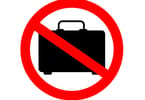The Bahamas is among the Caribbean nations that have suffered the highest declines in tourist arrivals during 2009, a new International Monetary Fund (IMF) report has confirmed, warning that the industry’s recovery and that of the wider Bahamian economy will not happen before 2011.
The IMF, in its assessment of the tourism outlook for the Caribbean, entitled A less crowded Caribbean next year?, said that for the year to May tourism arrivals to the Bahamas were down by 14.1 per cent, compared to a 3.4 per cent increase for Jamaica and falls of just 2.4 per cent and 9.4 per cent for the Dominican Republic and St Lucia respectively.
Also faring better than the Bahamas, comparatively speaking, were Barbados and Antigua & Barbuda, whose tourist arrivals to July 2009 were down by 10.7 per cent and 12.8 per cent respectively.
The only Caribbean nations faring worse than the Bahamas were St Vincent & the Grenadines and St Kitts and Nevis, who were off by 17.4 per cent and 27 per cent respectively for the year to June 2009.
And the IMF analysis warned that tourist-dependent countries such as the Bahamas were likely to experience a relatively long recession compared to other nations, because the consumer confidence and employment levels in developed countries, upon which they depended, typically lagged behind output recoveries.
With US unemployment rates set to enter double digits for the first time in 60 years, and forecast to remain in that territory until the 2010 fourth quarter, it seems reasonable to assume that economic recovery in the Bahamas may not commence until the 2011 mid-point – the 2011 winter season or first quarter at the earliest.
“The effects of the financial crisis on the Caribbean will likely persist into 2010 because tourism depends on employment conditions in advanced economies, which typically lag output recoveries,” the IMF said.
“In the 2001 recession, for example, declines in tourist arrivals to Mexico and the Caribbean followed increases in unemployment rates which did not improve until 2003, despite an output recovery in 2002.”
The outlook for Bahamian tourism, the IMF suggested, could be further impacted by the increasing US openness towards Cuba and a “potentially sharp recovery in Mexico”.
It pointed out that the US move to lift travel restrictions on residents with family in Cuba had boosted their arrivals to the island nation by 11 per cent, and overall arrivals by 6 per cent.
“Although the impact on the Caribbean of this change is likely to be small, further near-term opening of US travel to Cuba would increase regional competition significantly,” the IMF warned.
And while the Caribbean had benefited from reduced tourist travel to Mexico amid swine flu and security concerns, “should Mexico recovery quickly in 2010, this would put further pressure on the Caribbean”.
WHAT TO TAKE AWAY FROM THIS ARTICLE:
- With US unemployment rates set to enter double digits for the first time in 60 years, and forecast to remain in that territory until the 2010 fourth quarter, it seems reasonable to assume that economic recovery in the Bahamas may not commence until the 2011 mid-point –.
- And the IMF analysis warned that tourist-dependent countries such as the Bahamas were likely to experience a relatively long recession compared to other nations, because the consumer confidence and employment levels in developed countries, upon which they depended, typically lagged behind output recoveries.
- It pointed out that the US move to lift travel restrictions on residents with family in Cuba had boosted their arrivals to the island nation by 11 per cent, and overall arrivals by 6 per cent.














![China's Hyperloop Train: A Glimpse into the Future of Transportation 12 Travel Tourism News | Domestic & International Hyperloop Train China [Photo: Hyperloop Transportation Technologies]](/cdn-cgi/image/width=145,height=100,fit=crop,quality=80,format=auto,onerror=redirect,metadata=none/wp-content/uploads/2024/02/180720163348-hyperlooptt-china-capsule.jpg)







